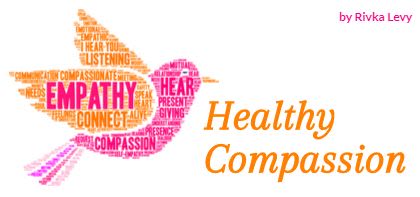
Healthy Compassion
When someone can’t truly empathize, they’ll usually find it next to impossible to treat the other person compassionately.

Last week, I discussed the need to read the warning lights in your life, instead of turning them off. Now, we will discuss each of the three foundations to good emotional health:
The First Foundation of Good Emotional Health: Healthy Compassion
There are two main ways that compassion can get out of balance and unhealthy, in every sense of the word. At one extreme, unhealthy compassion can mean that you’re often trying to do everything for everyone else, getting trodden-on in the process, and not taking the time to nurture yourself and give yourself what you really need. You don’t need a PhD in holistic healing to see that if this state of affairs continues for any length of time, it can severely affect your mental, emotional and physical health.
At the other extreme, if you tend to ONLY think about yourself and what you need, and you often act in a self-absorbed, selfish way – that means that you can’t ‘see’ anyone else in the picture, or take anybody else’s needs into account. That can also seriously impact your mental and physical well-being (and leave you with no friends…)
So how can you strike the balance between these two extremes, and develop spiritually healthy compassion that lets you empathize with other people without getting buried underneath all their problems, or being taken for a ride, or being treated like dirt?
Compassion is NOT the Norm Today
Healthy compassion is pretty rare in our modern world. When people upset us, inconvenience us, fail to do exactly what we want or what suits us, or damage our possessions in some way, the common response is to get upset and bite their heads off.
That’s the normal way of today’s world, but it’s not the spiritually healthy way. You could sum up the spiritually healthy way with one word: empathy.
The dictionary definition of ‘empathy’: the power to enter into another’s personality and imaginatively experiencing his experiences.
To put it another way: It’s the ability to imagine reality from another person’s point of view, to “step into his shoes” so to speak and see life from his perspective.
The problem is, when someone can’t truly empathize, they’ll usually find it next to impossible to treat the other person compassionately.
Feel Yourself, First
If you’re starting to realize that you also find it hard to treat other people with genuine empathy and compassion, don’t panic! It’s usually only because you haven’t experienced very much of it in your own life.
Remember what I just explained: Compassion is NOT the norm these days, which means that most of us have no idea about how different our lives would be if we were regularly getting more healthy compassion from others.
One of the main aims of this series is to help you to engage with your feelings and get back in touch with the ‘real you.’ Once you’re back in touch with the real you, you’ll also find it much easier to treat others with more compassion and empathy.
When someone is really trying to empathize with you, they’ll be genuinely interested in what you’re telling them, and they’ll show that by asking you pertinent questions about the difficulty, issue or upset you’re experiencing. Then when you start speaking, they will make a real effort to listen to what you’re telling them.
If you make it clear that you don’t want to talk about it, they’ll respectfully back off. If it’s obvious you need reassurance, encouragement, or moral support, an empathetic person will do their best to try to reflect those things back at you. If you want space, they give you space. If you want reassurance or a shoulder to cry on, a genuinely empathetic person will pick up on your signals and do their best to give you what you need.
Genuine empathetic listening always contains the following elements:
-
Ask about the situation, and really want to know what’s going on.
-
Listen attentively to the response.
-
Reflect what the person is saying, or needs, back to them.
Next week, we’ll discuss some real-life examples to explain how this dynamic can play out, including how the lack of empathy often leads to verbal cruelty.














11/08/2019
First time I got to your article, it’s fantastic and right on target- I like how you write and would like to read from where you started this topic and follow as you continue Is there a way I can get your articles directly to my email as you update?